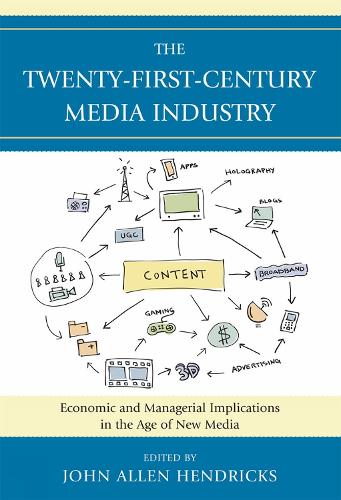
The Twenty-First-Century Media Industry: Economic and Managerial Implications in the Age of New Media
(Paperback)
Publishing Details
The Twenty-First-Century Media Industry: Economic and Managerial Implications in the Age of New Media
By (Author) John Allen Hendricks
Contributions by Alan B. Albarran
Contributions by Robert Bellamy
Contributions by Alexander Cohen
Contributions by Tony R. DeMars
Contributions by Douglas A. Ferguson
Contributions by Robert Gross
Contributions by Jennifer M. McClure
Contributions by Jennifer Meadows
Contributions by Stephen Phipps
Bloomsbury Publishing PLC
Lexington Books
15th July 2011
United States
Classifications
Professional and Scholarly
Non Fiction
Communications engineering / telecommunications
384.068
Physical Properties
Paperback
312
Width 156mm, Height 232mm, Spine 19mm
463g
Description
The Twenty-First-Century Media Industry examines the role that new media technologies are having on the traditional media industry from a media management perspective. It provides an intriguing examination of how traditional media industries are adapting to new media technologies and evolving in the twenty-first century.
Reviews
The 21st Century Media Industry is well worth reading not only for its broad scope, but for the timeliness of the chapters. Readers of this book will come away with a clear conceptual map of the changing media landscape as well as a detailed understanding of the challenges of the years ahead in forging a new business model, or set of business models, for media operating in the digital age. -- John V. Pavlik, Rutgers University
Predicting the future of the media industry at this juncture may sound audacious, yet this volume does so, and the future it presents is auspicious. The 13 chaptersall by US academicians and media scholars with impressive credentialsaddress possible approaches to media management, new technologies and innovations, and the implications of various media: recorded music, print, journalism, cable and broadcasting (including radio), cinema, the Internet, mobile telephones. Media have saturated modern society for the past 50 years. The opening essay, coauthored by Hendricks (Stephen F. Austin State Univ.) and Susan Smith, notes that 'the latter half of the twentieth century saw an explosion in the communication industry [with] personal computers, satellites, cable television, cell phones, digital and high definition television, DVDs and the World Wide Web.' But, the essay goes on to observe, the change is not in the media per se but rather in the 'delivery systems.' That the book does not offer an exact definition of the term 'new media' is only right, given that in the 1450s the printing press was a 'new medium.' Summing Up: Highly recommended. Upper-division undergraduates through faculty. * CHOICE *
